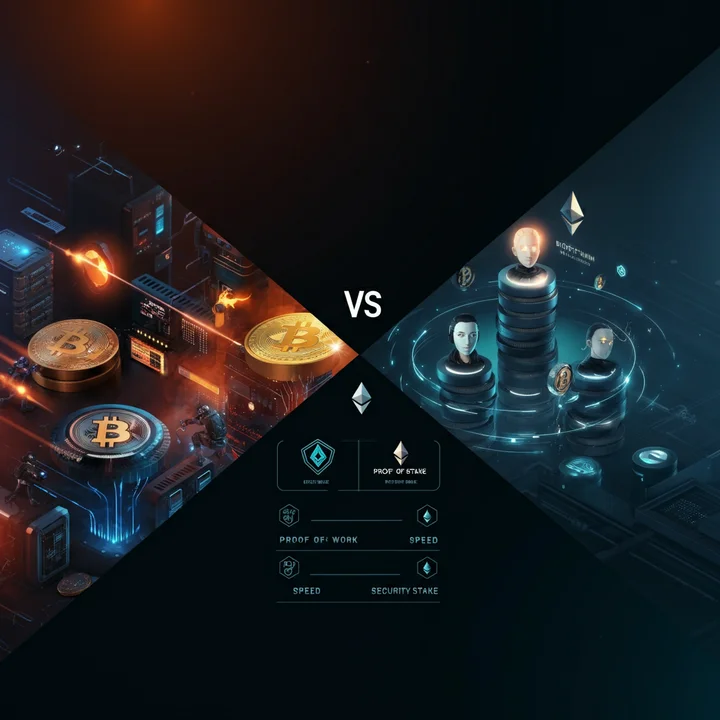Blockchain technology is no longer confined to the realms of cryptocurrency; it’s transforming the very foundations of traditional industries. From revolutionizing financial services to enhancing transparency in supply chains, blockchain is reshaping how businesses operate and interact with consumers. But how exactly is it achieving this disruption? And what does it mean for the future of these industries?
This blog explores the key ways blockchain is overhauling traditional systems. We'll compare blockchain to conventional methods, look into real-life applications in sectors like finance, healthcare, and legal, and shed light on the challenges and future potential of this groundbreaking technology.
Traditional Systems vs. Blockchain Technology
Before we examine specific industries, it’s important to understand the key differences between traditional systems and blockchain technology.
Centralization vs. Decentralization
Traditional systems rely on centralized databases governed by a single authority, such as banks, governments, or corporations. Blockchain operates as a decentralized network where no single entity has full control.
Manual Processes vs. Automation
Many traditional systems use time-consuming manual processes. Blockchain streamlines operations with automation via smart contracts, reducing inefficiencies.
Opaque Methods vs. Transparency
Conventional systems often lack transparency, making it difficult to track transactions or verify data. Blockchain, on the other hand, maintains an immutable ledger accessible to all participants in the network.
These qualities make blockchain a compelling alternative for many businesses looking to modernize.
Industry Examples of Blockchain in Action
1. Finance: Decentralized Finance (DeFi) vs. Banks
The financial industry has perhaps seen the most disruption from blockchain. Decentralized Finance, or DeFi, eliminates intermediaries like banks by enabling peer-to-peer transactions on blockchain networks.
Traditional banking challenges: High transaction fees, delays in cross-border payments, and limited access for unbanked populations.
Blockchain solutions: DeFi platforms like Uniswap and Aave allow instant, low-cost transactions, giving users greater control over their funds. Additionally, blockchain-based stablecoins like USDC provide a stable alternative to volatile cryptocurrencies.
Blockchain’s ability to facilitate direct transactions is changing how individuals and businesses interact with money.
2. Healthcare: Medical Record Security
The healthcare industry is plagued by inefficiencies in managing sensitive patient data. Information is often siloed in various institutions, making sharing and securing records a challenge.
Traditional system issues: Paper-based records and outdated electronic medical record (EMR) systems are vulnerable to hacking and errors.
Blockchain applications: Blockchain creates tamper-proof medical records that can only be accessed with patient consent. Projects like Medicalchain and Guardtime ensure transparency and security while improving data access for healthcare providers.
These improvements can save lives by providing accurate, accessible health data during emergencies.
3. Supply Chain: Product Traceability
Modern supply chains are complex, often spanning several countries. This complexity can result in delays, fraud, and lack of accountability.
Traditional supply chain challenges: Tracking a product’s journey can be prone to human error and difficult to verify.
Blockchain solutions: Platforms like IBM’s Food Trust are using blockchain to track items from their source to final destination. For example, growers, distributors, and retailers use blockchain to trace food products in real time, ensuring quality and reducing waste.
This transparency helps businesses build consumer trust while streamlining logistics.
4. Real Estate: Smart Contracts
Buying and selling property typically involves lengthy processes, high fees, and plenty of legal paperwork.
Traditional real estate issues: Transactions rely on intermediaries like lawyers and brokers, all of whom contribute to delays and extra costs.
Blockchain for real estate: Smart contracts on platforms like Ethereum automate agreements between buyers and sellers without the need for intermediaries. Propy, for instance, enables digital property transactions that are faster and more secure.
This modern approach to real estate makes the process smoother for both buyers and sellers.
5. Legal Industry: Digital Agreements
The legal industry, often reliant on paper contracts and outdated workflows, is ready for a digital revolution.
Conventional legal processes: Drafting and executing contracts manually is time-consuming and leaves room for disputes.
Blockchain’s impact: Digital agreements and smart contracts execute automatically when predefined conditions are met. By reducing the reliance on physical documentation, platforms like OpenLaw are cutting inefficiencies and legal fees.
Benefits for Businesses and Consumers
Blockchain offers a host of benefits for both businesses and their customers. Here's how it adds value:
Enhanced Security: Immutable ledgers and encryption safeguard sensitive data.
Cost Savings: By eliminating intermediaries, blockchain reduces transaction fees.
Transparency: Real-time tracking and open ledgers foster trust between organizations and individuals.
Accessibility: Decentralized networks provide financial and digital services to underserved communities.
These advantages make blockchain an attractive solution across industries.
Current Limitations and Challenges
Despite its promise, blockchain is not without its challenges:
Scalability: Current blockchain networks struggle to handle large transaction volumes.
Regulatory Uncertainty: Governments worldwide grapple with creating policies for this emerging technology.
Energy Consumption: Some blockchains, such as Bitcoin, require substantial energy, raising sustainability concerns.
Technical Barriers: Setting up and managing blockchain infrastructure requires expertise that many businesses currently lack.
While these hurdles are significant, ongoing innovation is addressing many of these issues.
What Lies Ahead for Blockchain
Blockchain technology is steadily maturing, and its adoption is expected to grow in the coming years:
Emerging technologies like Layer 2 scaling solutions (e.g., Polygon) aim to enhance network scalability.
Regulatory frameworks are beginning to take shape, providing more clarity for industries.
Sustainability-focused blockchains like Tezos and Algorand are addressing concerns about environmental impact.
It’s clear that blockchain will continue to disrupt traditional industries, offering opportunities for organizations willing to explore its potential.
Unlock Blockchain’s Potential for Your Business
The disruption caused by blockchain technology is just beginning. From decentralized finance and transparent supply chains to secure healthcare records and automated contracts, the impact is undeniable. However, adopting blockchain successfully requires a clear understanding of its applications, challenges, and benefits.
Are you ready to explore how blockchain can revolutionize your business processes? Stay informed and ahead of the curve by integrating blockchain innovations into your strategy.



